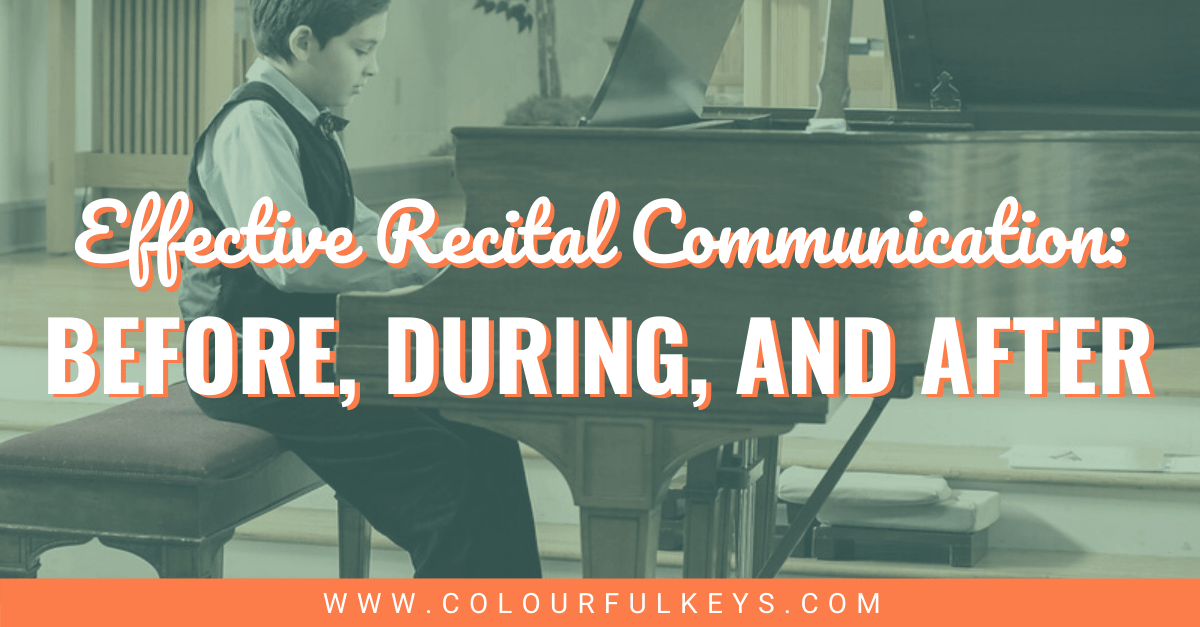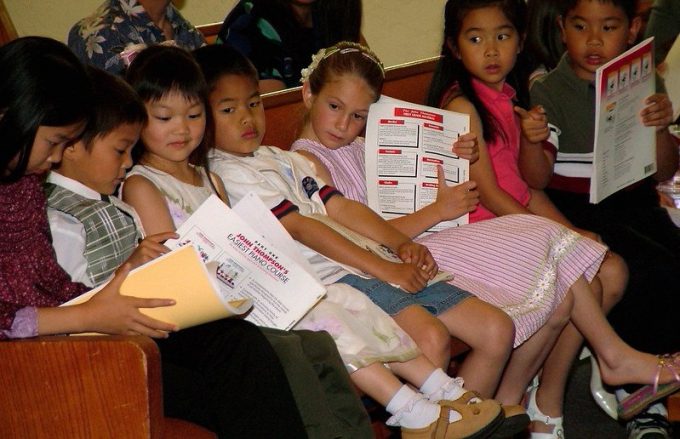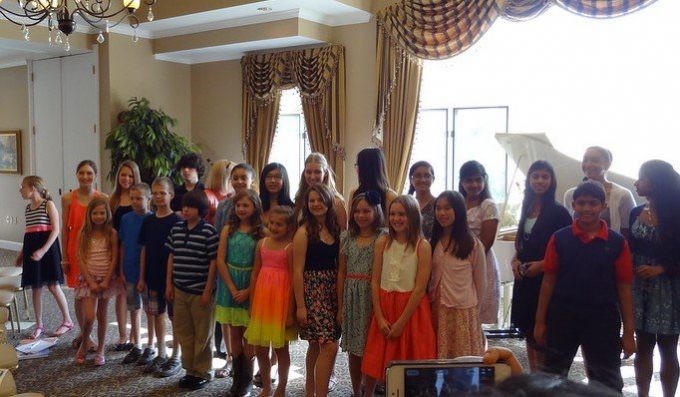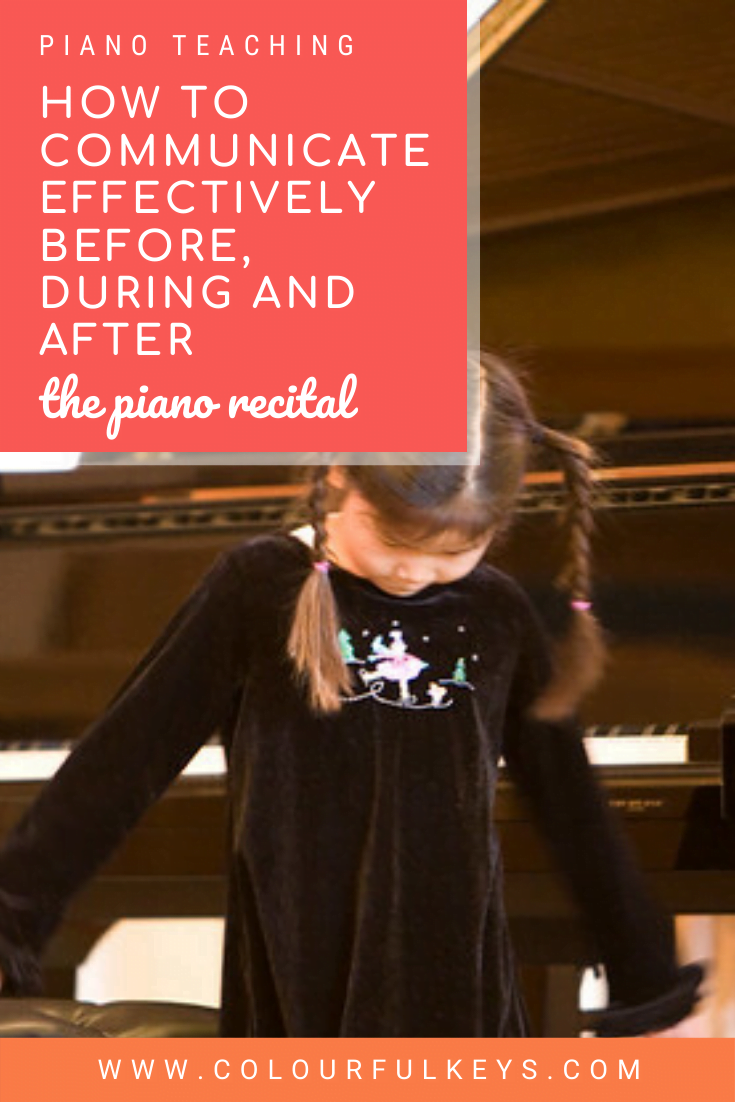This guest article about effective recital communication was written by Julia Omelko. Julia is a piano teacher and performer who runs a piano studio in New York. After studying with Vincent Lenti of the Eastman School of Music and finishing her graphic design degree, Julia decided to take her teaching and mentoring more seriously, slowly growing until she was able to teach full time. Outside of teaching and performing, she is also interested in electronic music production and ways to incorporate technology and music production into her piano teaching. Enjoy! – Nicola
Every time recital season rolls around, it seems as though it should be a little less stressful each time. But somehow, every time it feels all the same.
This stress just seems to grow exponentially the more students there are in your studio and, at a certain point, it’s not enough just to mention the time and date, have them show up a few minutes early, and then expect everything to run smoothly.

As my studio has grown, I’ve realized that each recital season gives us the opportunity to improve our communication with others before, during, and after a recital. Not only will this help with the stress and bustle of recital season, but it can help strengthen student, parent, and teacher relationships while setting helpful precedents for future recitals.
I’d like to share the ways I approach communication in my studio. Although I will be focused on communication during recital season, these tips can apply to the rest of the year as well.
Before the Recital
Communicating with Parents
Parent communication is top priority, so there are several ways I approach this.
I send out group texts a couple of months beforehand, clarifying which date would work best for most people.
I keep mentioning the recital, and discussing each student’s progress, what they need to improve on, and how to do so most effectively. Once parents know that there is a performance coming up, they tend to be more consistent with encouraging the students to practice.
Once the date is established, I send home an info sheet. This sheet contains all the basic logistics info that parents will need, along with any other information I would like to let them know (such as dress code or rules about flash photography.) I find that a lot of parents like to have a physical copy to go back and refer to.
I try not to get frustrated by the parents who will inevitably contact me with random questions and concerns, especially the parents who will text you right before the recital to ask “so, when do we need to be there?” Remember, frustrated parents won’t help your students stay calm and composed.
Communicating with Students
One to two months before the recital, I try to begin using these strategies with my students.

Conversations
Instead of telling telling to try getting rid of nerves, I tell them that they will be nervous, and that’s okay! We discuss ways not to let the nervousness overtake them (taking a deep breath, preparing your hands and thinking through your first few notes, remembering to just keep going if you mess up, etc.) This is very important because you can keep reminding your students to practice these strategies right up to the moment they walk on stage.
Dry-Run
Have the students practice walking in like they would at the recital, bowing, and playing their piece all the way through as well as possible. When we have only a couple of weeks left before the recital, I’ll have them walk right in and practice performing their program without even warming up. This improves not only their confidence with the performing, but also improves communication because they will know exactly what to do once it comes time for the recital.
For more piano performance tips to share with your students, you may appreciate Nicola’s article Playing Your Best When It Counts.
Dress Rehearsal
Have a dress rehearsal! This is something that I tried out my last recital, and I regret not trying it out sooner. Dress rehearsals make the students more confident because they know exactly where to go, how to walk in, and what it will be like.
Rehearsals at the recital venue give students another chance to perform, try out the piano, and perform in front of their peers (which seems to be a lot more stressful for them than performing in front of the general crowd!).
Rehearsals often lead to another mode of communication: Real-time feedback. Students may realize problems they hadn’t thought about (such as bench being too low, for example), which we can then adjust. I find that just about every student performed significantly better at the actual recital, which was only two days after the dress rehearsal.
Lastly, having rehearsals makes you think of the random, last minute things that you should be aware of but may have forgotten. For example, I forgot that I needed to check if the piano bench was at an appropriate height, and I may have forgotten to adjust it if a couple students hadn’t pointed it out at the dress rehearsal.

During the Recital
The recital is now the time to implement all the communication strategies you’ve been working on up to this point.
One final safeguard that I put into place was having my oldest student sit in the front to remind students when they had to go up on stage, as well as helping with general traffic control. This freed me up to be able to run things backstage and gives the students security that they will always have someone to communicate with if an issue should arise.
Since I am backstage during the entire recital, I have a wonderful opportunity to chat with each student for a minute before they go up on stage, and remind them of all the strategies we’ve been working on.
After the Recital
It may be tempting to breathe a sigh of relief and just move on with new material. However, if handled appropriately, this can be a golden opportunity for learning!
Peer Feedback
I’ve noticed that after just about every recital, there will often be several students mentioning how they particularly enjoyed a piece that someone played, and some even request to play it. Since the students are listening to everyone perform, you might like to give them a little form where they can mark off which student’s performance they liked, and then check off boxes about what they particularly thought the student did well. Anonymously forward this feedback to every student.

Self-Reflection
A recital is an excellent opportunity for self-reflection. A short conversation with the student about what they thought they did well and what they could have done better is fantastic, but try taking it a step further and have them do a little project about it. These things can be filed away and referred to before the next recital, or just at a later date to see how far the student has come.
- 3 things they did well
- 3 things they think they could have done better
- 3 things that inspired them from another person’s performance
- 3 things they wish they would have done to prepare better
- 3 emotions they felt during someone else’s performance
Parent Feedback
Try talking to the parents to see what they enjoyed and what they didn’t, and what they would change for next time. Of course, this is one of those things that should perhaps sometimes be taken with a grain of salt, but it’s nice to see where people’s heads are and it may give you some new ideas.
Overall, communication is one of the most important things to consistently practice and improve upon, and it can make for an awesome recital. I hope some of the thoughts here have helped you or given you something new to think about!
For more ideas and inspiration about performances, check out the Recitals section of the Colourful Keys Business page.
